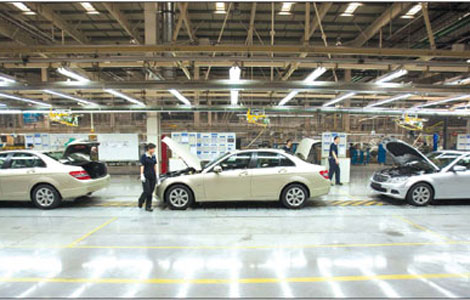Op-Ed Contributors
Making people happy
Updated: 2011-03-02 07:43
By Hu Angang (China Daily)
Focus of development needs to shift to fairness and the social and environmental impacts of growth
Rapid economic development is transforming China from a low-income to a medium-income nation. Now an influential economy, China is at a crucial stage of industrialization and urbanization and faces many challenges in economic development, such as transforming the nature of economic growth and ensuring its sustainability, tackling unequal income distribution and ensuring the balanced development of economy and society.
Let's look at these challenges in more detail. First, structural problems in China's economic growth model are increasingly apparent and require urgent resolution if the country is to develop sustainably. Investment-led growth has caused a grave imbalance between the roles of consumption and investment, and this continues to worsen. But China no longer has the domestic resources to support that investment-led approach.
Second, as the economy has grown, the distribution of income has worsened. The proportion of China's GDP made up of household income dropped by 10 percentage points between 1996 and 2006, and the gap between rich and poor and urban and rural residents is widening - with no sign of a turnaround. There can be no doubt this is a major threat to the construction of a harmonious society.
Third, personal livelihoods have failed to keep pace with rapid economic development. As the welfare system of the planned economy has been dismantled, the cost of education, access to healthcare and high house prices have become common issues of concern, and the government finds itself challenged by food and workplace safety, environmental degradation and corruption.
The focus of economic development needs to shift from expansion and investment to the quality and fairness of growth and its social and environmental impacts, otherwise, the nation risks falling into the middle-income trap.
In his 2007 report to the 17th National Congress of the Party, Party leader Hu Jintao made clear that a "people-first" approach lies at the heart of the Scientific Outlook on Development. Premier Wen Jiabao has also told the National People's Congress that everything the government does is aimed at providing people with happier and more dignified lives and at creating a more just and harmonious society. A people-first mode of development would increase happiness, and public policy founded on achieving that happiness could become the foundation of China's harmonious society.
National happiness has also become a focus for academic research. The most influential study on this issue is the World Values Survey, which has so far examined 98 countries or regions. Using the data obtained, international happiness expert Ronald F. Inglehart has identified two stages in the relationship between survival, well-being and per-capita GDP - economic gains and lifestyle changes.
E-paper

Factory fever
Despite auto manufacturing bubble scare, car giants gear up expansion of factories.
Dressed for success
Fabric of change
High spirits
Specials

Earthquake Hits Japan
A massive 8.8 magnitude quake hit the northeast coast of Japan on March 11,2011.

NPC & CPPCC sessions
Lawmakers and political advisers gather in Beijing to discuss major issues.

Slide: Japan quake
Devastating earthquake and tsunami left millions without water, electricity, homes or heat.
